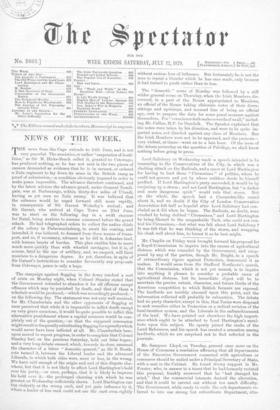The campaign against flogging in the Army reached a sort
of crisis on Monday night, when Colonel Stanley stated that thb Government intended to abandon it for all offences except offences which may be punished by death, and that of them a schedule would be produ ced,—which was accordinglyprod aced,— on the following day. The statement was not very well received, for Mr. Chamberlain and the other opponents of flogging at once perceived that while it is impossible to inflict death except on very grave occasions, it would be quite possible to inflict this alternative punishment where a capitol sentence would be com- pletely out of the question,—so that the supposed concession might result in frequently substituting flogging for a penaltywhich would never have been inflicted at all. Mr. Chamberlain here- upon moved to report progress, in order to complain that Colonel Stanley had, on the previous Saturday, held out false hopes ; and a very long debate ensued, which, towards its close, assumed the character of a bitter "domestic quarrel," as Sir S. North- cote termed it, between the Liberal leader and the advanced Liberals, in which both sides were, more or less, in the wrong. We have said enough of the origin and end of this dispute else- where, but that it is not likely to affect Lord Hartington's hold over his party,—or even, perhaps, that it is likely to improve his hold over it,—the prolonged cheering with which he was greeted on Wednesday sufficiently shows. Lord Haxtington can tug violently at the wrong curb, and yet gain influence by it, where a leader of less rank could not use the curb even rightly without serious loss of influence. But fortunately he is not the man to repeat a blunder which he has once made, only because it had turned to profit rather than to loss.


































